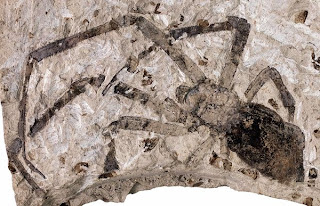Ponerah- Measuring nearly 1 inch (2.5 centimeters) in length, the 165-million-year-old fossil was uncovered in 2005 by farmers in Inner Mongolia a region teeming with fossils from the middle Jurassic period.
"Compared to all other spider fossils, this one is huge," said study co-author ChungKun Shih, a visiting professor at Capital Normal University in Beijing, China.
"When I first saw it, I immediately realized that it was very unique not only because of its size, but also because the preservation was excellent," Shih said.
Fine volcanic ash preserved the specimen's exquisite features, such as mouthparts and hairlike structures that covered its legs, according to the study.
These features allowed scientists to classify it as Nephila jurassica, a new species in the genus Nephila—a surviving group of spiders that weave 5-foot (1.5-meter) webs of strong, golden silk. Among the largest web-weaving spiders today, these creatures can reach lengths of up to 2 inches (5 centimeters).
The fossil spider shows that Nephila is the spider genus that's been around the longest. The rare discovery pushes back the origin of the genus by about 130 million years.
Because modern-day Nephila spiders thrive in tropical and subtropical habitats, the discovery also provides evidence that northeastern China was warmer and more humid during the Jurassic than it is now.
Likewise, the find may mean that such spiders capable of catching large bugs with their extensive webs played an important role in the evolution of insects.
"If insects wanted to survive, they had to figure out a way to avoid being caught by the web," Shih said.
Source: nationalgeographic.com
Read more »






1 comments:
gan! tuh arachnida, makannya apa gan? kebanyakan lemak tuh
Post a Comment